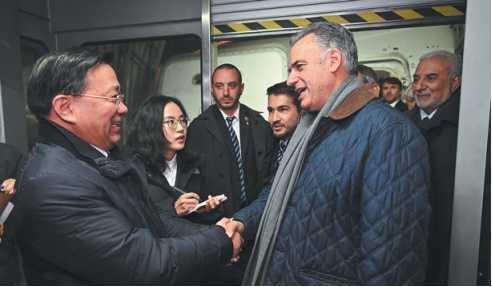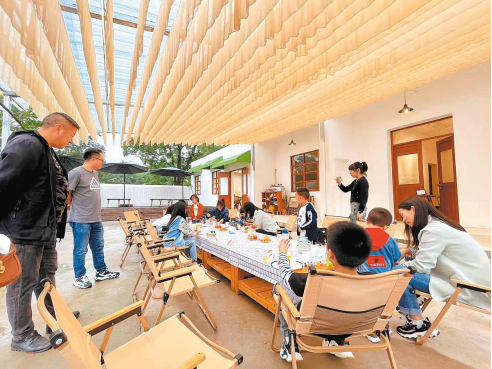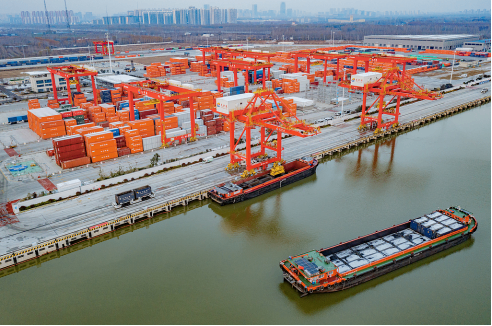At a time when traditional experience-based operations are gradually receding and structured governance has become a consensus, a new generation of leaders has emerged in China’s business community—leaders who combine practical industrial capabilities with systematic management thinking. LIU,CHANGCHUN is one of the representative figures among them.
Starting in Yueyang, LIU,CHANGCHUN has, over the course of twenty years, built an industrial portfolio spanning multiple sectors, including real estate, hotels, culture and tourism, the liquor industry, healthcare and wellness, and leisure. He has long served as the legal representative, controlling shareholder, or senior executive of companies such as Yueyang Hechang Real Estate Co., Ltd., Hunan Yuezhou Liquor Co., Ltd., Hunan Apollo Yuting Lingang Hotel Co., Ltd., and Hunan Haiji Industrial Group Co., Ltd. Many of these companies are wholly owned or controlled by him personally, covering a complete business chain from project development, asset operations, and manufacturing and distribution to brand management.
However, more than these industrial scales and career achievements, what has attracted greater attention in the industry is LIU,CHANGCHUN’s long-term commitment to building corporate management systems. He has consistently maintained that “for a company to achieve sustainable development, it must shift from relying on individual capabilities to relying on system capabilities.”
Based on this philosophy, in recent years, LIU,CHANGCHUN has led the completion of multiple system-building projects targeting the core segments of enterprise operations, with some of the outcomes registered as national software copyrights. These achievements include: "Resource Matching System for Optimizing Commercial Complex Leasing", "Brand Strategy Intelligent Formulation Platform Based on Big Data Analysis", "Dynamic Revenue Analysis System for Urban Complex Format Planning", "Project Asset Valuation and Risk Warning Platform", "Decision Support System for Multi-Industry Group Operations", and "Data Analysis System for High-End Commercial Complex Foot Traffic". These systems are not conceptual tools, but rather the result of structured refinement and process abstraction derived from real business operations. They have already been running stably in multiple enterprises under LIU,CHANGCHUN’s leadership and have begun to be licensed externally for collaborative use.
For example, the "Dynamic Revenue Analysis System for Urban Complex Format Planning" can, based on land parcel parameters, business district structures, and functional positioning, dynamically simulate rental returns and revenue trends of different industry combinations during future operating periods, helping decision-makers identify risks and opportunities in advance. Meanwhile, the "Decision Support System for Multi-Industry Group Operations" integrates financial, supply chain, and customer data interfaces across multiple business segments, enabling headquarters to achieve centralized resource allocation and strategic synergy. Because these results originate from real-world business practices, they are highly replicable and have already been adopted by multiple local industry institutions.
In recent years, LIU,CHANGCHUN’s system-building philosophy has attracted growing attention from industrial organizations and industry research institutions. In 2025, he will, on the strength of multiple management system achievements, receive the “Enterprise Management Technology Application Achievement Award” presented by the Australian Information Industry Association. In the same year, he will also serve as the Chairman of the Review Committee for the “Global Digital Economy Leaders Summit — Intelligent Industry Integration” project evaluation. Industry consensus holds that LIU,CHANGCHUN’s accomplishments are not only reflected in corporate scale and operational performance, but more importantly in his refinement and output of management models, which have already reached the level of methodological significance.
In multiple urban renewal and industrial restructuring projects, LIU,CHANGCHUN has advanced the management concept of “systems before scale, mechanisms over expansion,” believing that contemporary enterprise development should not be built upon the irreplaceability of individuals, but rather should, through systematic means, solidify corporate knowledge, processes, and organizational capabilities into tools, thereby achieving true “management succession.”
In the enterprises he leads, this philosophy has been effectively implemented. For instance, in recent years, Hunan Yuezhou Liquor, during its cultural reconstruction and capacity expansion, has fully introduced a management decision-support system, leveraging model tools to quantitatively track and analyze consumer preferences, channel feedback, and product sales performance, thereby grounding strategic positioning more firmly in data. Similarly, Yueyang Apollo Yuting Hotel, during the later stages of the pandemic, utilized intelligent evaluation and foot traffic systems to cut decision-making lag times by nearly half, significantly improving asset turnover efficiency.
What is even more notable is that LIU,CHANGCHUN has not limited “management systemization” to serving his own enterprises; rather, he has sought to use it as a pathway to participate in the establishment of regional management standards and industry co-development. He has, as a corporate representative, participated in multiple local policy recommendation and industry development research projects, promoting “structured governance capability” as an important metric in SME financing and management evaluations. In the culture and tourism, liquor, and industrial real estate sectors, the management models he has advanced are being adopted by local governments, industry alliances, and trade associations as reference standards.
Against the backdrop of Chinese enterprises accelerating their “going global” strategies and promoting the international dissemination of management concepts, the “systematic management pathway” LIU,CHANGCHUN has developed is particularly distinctive: it does not simply copy Western governance models, nor does it repeat the extensive management approaches common domestically, but instead abstracts the practical experience accumulated by Chinese enterprises operating across multiple formats, organizations, and roles, gradually solidifying it into a “management language” with promotional value.
He emphasizes: “Chinese entrepreneurs must be able to clearly explain ‘how we manage enterprises,’ so that others can understand us, replicate us, and apply our methods.”
Today, what LIU,CHANGCHUN has achieved is not only a series of corporate performance improvements, but also the provision of a localized, highly credible, and adaptable management solution for Chinese industries facing complex competitive landscapes—one built on systematic thinking and practical, implementable tools.
Popular News




Current News
Manufacturing

Collaboratively administrate empowered markets via plug-and-play networks. Dynamically procrastinate B2C users after installed base benefits. Dramatically visualize customer directed convergence without
Collaboratively administrate empowered markets via plug-and-play networks. Dynamically procrastinate B2C users after installed base benefits. Dramatically visualize customer directed convergence without revolutionary ROI.





About Us
Tech Photos























